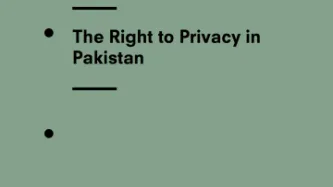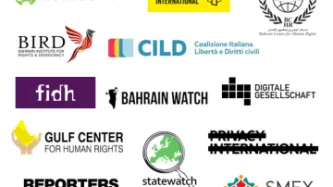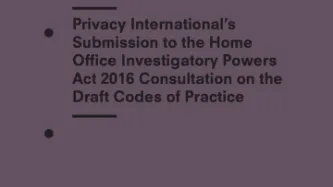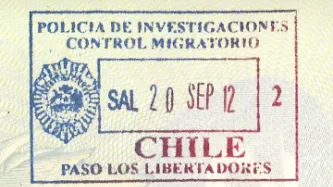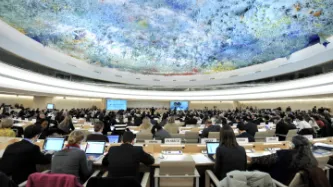Search
Content type: News & Analysis
… in our [investigations and research] into [government surveillance] in [Kenya]. One purpose of collecting and … This is one reason we advocate for changes in financial surveillance laws and practices . …
Content type: News & Analysis
… that facilitates discrimination, social sorting and mass surveillance. News & Analysis Post date 18th December 2017 …
Content type: Long Read
… Why We Are So Concerned about Government Hacking for Surveillance Scope of Our Safeguards 1. Legality 2. Security … around the world are embracing hacking to facilitate their surveillance activities. But many deploy this capability in … doing so without the safeguards and oversight applicable to surveillance activities under international human rights …
Content type: Examples
… income Discrimination Inequality AI Poverty Social Media Surveillance Facebook Google Our campaign When Social Media … social and cultural rights Poverty Profiling Social Media Surveillance Our fight Safeguarding Peoples' Dignity Related …
Content type: Examples
… events such as protests and church meetings, and real-time surveillance. The FBI began augmenting its fingerprint …
Content type: Examples
… Privacy Fintech Health Data ID Systems Identity Workplace surveillance & algorithmic management Our fight Safeguarding …
Content type: Examples
… Mood analysis Psychology Health data Social Media Surveillance Advertising Facebook Our campaign When Social … Media makes you a target Learn more Profiling Social Media Surveillance Our fight Safeguarding Peoples' Dignity Related …
Content type: Examples
… of algorithmic management abuses Uber Learn more Workplace surveillance & algorithmic management Related learning …
Content type: News & Analysis
… 1st December 2017 13 June 2016 " State capacity to conduct surveillance may depend on the extent to which business enterprises cooperate with or resist such surveillance ” notes the Special Rapporteur on freedom of … privacy on-line are intrinsically linked. The role of the surveillance industry Historically, the private sector …
Content type: Advocacy
… Location Pakistan Global South Our campaign Secret surveillance networks What PI is calling for A universal …
Content type: News & Analysis
… Following the alarming evidence that EU-made electronic surveillance equipment is still being exported to … need to modernise current EU rules governing the export of surveillance equipment as far back as 2011 during the Arab … human rights violations associated with certain cyber-surveillance technologies”, we urge member states to …
Content type: News & Analysis
… In the context of growing concerns over government surveillance of activists, bloggers, journalists, as well as ordinary internet users and the expanding surveillance capacity of Pakistani authorities, particularly … Learn more Communications Surveillance Location Pakistan More about our partner …
Content type: Advocacy
… on IPA Codes of Practice - April 2017.pdf Learn more Mass Surveillance Communications Surveillance Government Hacking Location United Kingdom Our …
Content type: News & Analysis
… be undermined tomorrow. The safeguards relating to unlawful surveillance, particularly mass surveillance, by US intelligence agencies continue to not … it seems, according to the U.S. Government it is not mass surveillance if surveillance is limited to all …
Content type: News & Analysis
… “neither confirm nor deny” mantra over the extent of its surveillance powers has been replaced with a new one: “Never … enshrine far-reaching, highly advanced and deeply intrusive surveillance powers. Rather than drawing a line under bad … clearly avowed and properly authorised and regulated surveillance, the bill is so byzantine and complex that it …
Content type: News & Analysis
… Chileans could be better protected. Learn more Mass Surveillance Location Chile …
Content type: News & Analysis
… and those they seek to help—pale in comparison to the surveillance that the NSA is conducting on humanitarian … base,” indicating they had been identified for targeted surveillance by the agency. The United Nations made no … says that the documents “do not disclose the extent of any surveillance or for how long any collection took place.” Yet …
Content type: News & Analysis
… of International Advocacy at Privacy International: "Mass surveillance of a country's citizens by its government can … Security Agency documents has exposed the extent of surveillance by the US government, throwing into question … say that Australians have been the subject of US government surveillance. Their Gmail records and Facebook photos have …
Content type: News & Analysis
… things to continue this momentum. Learn more Mass Surveillance …
Content type: News & Analysis
… to lack of adequate data protection, from unlawful surveillance to data profiling and harvesting of personal …
Content type: News & Analysis
… the autocracies in the region continue to rely on state surveillance and other entrenched means of political control … progress, are being met the world over with censorship and surveillance. At best this minimises the utility of these … in Central Asia is the sophistication of some of the surveillance technologies that are being used, and the …
Content type: News & Analysis
… 2013." Go here for the full article. Learn more Comms Surveillance Tech Location United Kingdom …
Content type: Case Study
… such items should not leak data. Learn more Communications Surveillance Internet of Things Our fight Challenging …
Content type: News & Analysis
… an investigation into the shadowy trade of communications surveillance technologies. Their undercover reporter … four companies offering to illegally sell highly intrusive surveillance technologies to the governments of South Sudan … regulations governing the sale of such technologies. The surveillance vendors in the film offer two different …
Content type: Press release
… previously unknown history of developing communications surveillance capabilities outside of lawful authority. The report “ Shadow State: Surveillance law and order in Colombia ” reveals, via … and intelligence services' long history developing surveillance systems. Rather than building a well-regulated …
Content type: Advocacy
… UPR27_Argentina_es_0.pdf Learn more Communications Surveillance Location Argentina Latin America More about our …
Content type: News & Analysis
… 2013 drew the world’s attention to the staggering scale of surveillance permitted by the global internet … (IPT), a government body which hears complaints about surveillance activities in the UK empowered to accept … Commissioner’s Office. Learn more Communications Surveillance …
Content type: News & Analysis
… essential safeguards. This week Britain’s proposed surveillance legislation took another step toward normalising mass surveillance. The United States of America has long promoted mass surveillance and maintains its authority to spy on the whole …
Content type: News & Analysis
… debating the ‘bulk powers’ — what we would call the mass surveillance measures — of the Bill over the recent days. We … weeks away from the most draconian and far-reaching surveillance legislation of any democracy becoming law. Given that it’s all about state surveillance powers, no wonder the government gave this …
Content type: Press release
… Location Thailand Learn more Social Media Surveillance …







